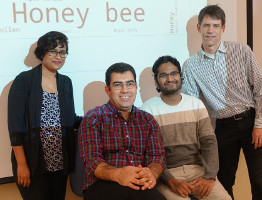News & Events
Research Highlight – Prof. Manda works with Biologists to understand trends in honeybee research

Dr. Prashanti Manda, Assistant Professor in the Department of Computer Science has been working on a project entitled “Building computational and data infrastructure for exploring honey bee diseases via text mining of scientific literature” in collaboration with researchers Dr. Esmaeil Amiri and Dr. Olav Rueppell from the Department of Biology.
“Colony Collapse Disorder,” a term coined in 2006 to indicate the collapse of honeybee hives due to various causes, is an important phenomenon that has environmental, agricultural, and financial implications. Dr. Manda’s project conducts a two-pronged data analysis of honeybee literature published from the 1950s to 2017 to examine trends and shifts in research focus over the years. The goal behind these analyses is to understand how the landscape of honeybee research has evolved since the introduction of the term “Colony Collapse Disorder (CCD).” First, the author provided keywords from papers across different years were examined to explore trending keywords, top new keywords introduced each year, and other associated information. Second, a text-mining approach called Topic Modeling was applied on the titles, abstracts, and keywords of publications to identify key latent research topics in each year. These topics shed light on how the research landscape shifted over time and the new areas of honey bee research that gained attention after CCD was introduced. Finally, the project developed a prototype for a honeybee disease ontology that categorizes the various causes of CCD. The ontology will enable the description of honey bee diseases and causes in a structured, consistent, and reusable manner.





